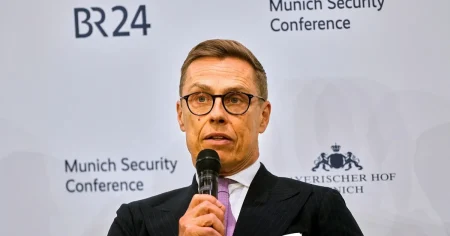Taleb al-Abdulmohsen, a 50-year-old Saudi Arabian asylum seeker in Germany, drove his BMW into a Christmas market in Magdeburg, killing five people. This act of violence, starkly juxtaposed against al-Abdulmohsen’s public renunciation of Islam and criticism of extremist groups, has raised questions about his motives and whether his outward persona was a façade. Saudi Arabia claims to have warned German authorities four times about al-Abdulmohsen’s extremist views, thrice to the intelligence service and once to the foreign ministry, but received no response. These warnings, if confirmed, raise serious questions about potential intelligence failures and their tragic consequences. Al-Abdulmohsen’s background presents a complex and puzzling picture. He had fled Saudi Arabia at 32, claiming asylum in Germany in 2016. He presented himself as a psychiatrist and founder of a human rights organization assisting Saudi women seeking refuge in Europe. However, Saudi authorities allege he was involved in human trafficking and had amassed a considerable amount of concerning information about him.
The attack, occurring shortly before Christmas and in the midst of the German federal election campaign, has the potential to significantly influence the political landscape. The incident could embolden radical political factions seeking to exploit public fear and anxiety for electoral gain. Although the specific motivations behind the attack remain under investigation, the timing adds a layer of complexity to the political discourse. While some, like the right-wing populist party Alternative for Germany (AfD), are already calling for tighter immigration controls and heightened security measures, other parties are exercising caution, awaiting a more complete understanding of the situation before issuing definitive statements. The potential for exploitation of this tragedy for political purposes highlights the sensitive and precarious nature of the current political climate.
Experts find the attack perplexing due to its seemingly contradictory nature. Al-Abdulmohsen, through his public pronouncements, vehemently opposed the same militant Islamist ideologies that could be construed as inspiring such an act. This raises the question of whether his islamophobia was genuine or a carefully constructed cover. Peter R. Neumann, a German researcher on radicalization, notes that while it is possible al-Abdulmohsen was a “sleeper agent,” his overt criticisms and public profile deviated significantly from typical sleeper agent behavior, which tends towards discretion and blending in. Neumann suggests that al-Abdulmohsen’s growing animosity towards the German state and society, coupled with a perceived fear of Islamization, provides a more plausible explanation for his actions. He postulates that recent public warnings about potential vehicle attacks on Christmas markets may have even served as inspiration for al-Abdulmohsen.
Al-Abdulmohsen’s increasingly apparent hatred for Germany, coupled with his feelings of persecution and being ignored, paints a picture of a troubled individual driven to extreme measures. The attack tragically mirrors the 2016 Berlin Christmas market attack, underscoring the vulnerability of such public gatherings and the ongoing challenge of preventing similar incidents. The fact that al-Abdulmohsen chose to target civilians is not surprising, given his documented hostility towards the German state. This targeted attack against innocent civilians underscores the tragic consequences of extremist ideologies, regardless of their specific nature.
The Saudi government’s claim of unheeded warnings about al-Abdulmohsen adds another dimension to the tragedy. If these warnings were indeed issued and ignored, it raises critical questions about communication and information sharing between intelligence agencies, and the potential consequences of such breakdowns. This element adds an international dimension to the investigation, demanding scrutiny of inter-governmental cooperation in addressing potential security threats. The lack of response from German authorities, if true, represents a serious lapse in security and highlights the complexities of international intelligence sharing and cooperation.
The aftermath of the Magdeburg attack has left a nation grappling with grief and searching for answers. The political implications of this tragic event are likely to be significant, particularly in light of the upcoming federal elections. The attack serves as a stark reminder of the challenges facing Germany and the broader international community in combating extremism and preventing future tragedies. As investigations unfold and more information comes to light, it is imperative that the focus remains on understanding the complex factors that contributed to this act of violence, and on implementing effective strategies to prevent similar incidents from occurring in the future. The attack also highlights the enduring vulnerability of open societies and the ongoing need for vigilance and preparedness in the face of evolving threats.














